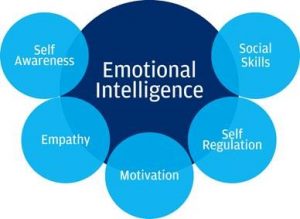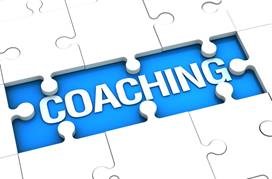Emotional Intelligence
 Emotional intelligence has been a hot topic in the workplace for quite a while, but what exactly does it mean and why is it so important? Emotional intelligence refers to a person’s ability to recognize and understand emotions both in themselves and others. According to Peter Salovey and John D. Mayer, two leading researchers on the topic, there are four different levels of emotional intelligence: perceiving emotions, reasoning with emotions, understanding emotions and managing emotions.
Emotional intelligence has been a hot topic in the workplace for quite a while, but what exactly does it mean and why is it so important? Emotional intelligence refers to a person’s ability to recognize and understand emotions both in themselves and others. According to Peter Salovey and John D. Mayer, two leading researchers on the topic, there are four different levels of emotional intelligence: perceiving emotions, reasoning with emotions, understanding emotions and managing emotions.
So, why does emotional intelligence matter in the workplace? Emotional intelligence is widely recognized as a valuable skill that helps improve communication, management, problem-solving and relationships within the office. Let’s take a look at the differences between a workplace with High Emotional Intelligence versus Low Emotional Intelligence:
High Emotional Intelligence Workplace
- Keeping cool under pressure
- Practicing effective conflict resolution
- Having greater empathy towards team members
- Listening and responding calmly to constructive criticism
- Making better decisions that benefit everyone and solving problems quickly and effectively
Low Emotional Intelligence Workplace
- Possessing a passive or aggressive communication style
- Refusing to work as a team
- Playing the “victim role” and not taking responsibility for behavior or work errors
- Being overly critical of others or not open to team members’ opinions
There’s no question which environment a person would rather work in day after day. And there’s also no question which workplace enjoys greater productivity, lower turnover and happier team members. Emotional intelligence plays a vital role not only in well being, but the overall success of a workplace.
Fortunately, emotional intelligence can be improved with training and practice. That’s where Leah M. Joppy and Associates can help. We’ve worked with many work teams to help them increase their knowledge of emotional intelligence in the office, put practical ideas into practice and look for areas of improvement. For more information, contact us at 301-670-0051 or email leah@lmja.com.
IMPLICIT BIAS (Part 2)
 Last month, we examined implicit (or unconscious) bias on a broad scale and how it comes into play in our day-to-day life. This month, we’re taking a look at implicit bias in the workplace and its impact. And no question about it, the impact can be vast – and costly for businesses. From impairing diversity and retention rates to undermining recruiting efforts and employee morale, the effects of implicit biases are widespread and should not be ignored.
Last month, we examined implicit (or unconscious) bias on a broad scale and how it comes into play in our day-to-day life. This month, we’re taking a look at implicit bias in the workplace and its impact. And no question about it, the impact can be vast – and costly for businesses. From impairing diversity and retention rates to undermining recruiting efforts and employee morale, the effects of implicit biases are widespread and should not be ignored.
An implicit bias is an unconscious association, belief, or attitude toward any social group. Due to these biases, people may often associate certain characteristics or qualities to all members of a particular group (stereotyping). There are all types of implicit biases, but some are more relevant to the workplace. Here are a few examples:
- Affinity bias: the tendency to prefer people who appear similar to ourselves
- Perception bias: the tendency to form stereotypes and assumptions about certain groups, thus preventing objectivity and lumping all individuals with their group membership
- Confirmation bias: the tendency to try to confirm pre-existing beliefs and ignore information that doesn’t conform to these beliefs
So, what can be done to combat implicit bias in the workplace? One of the most important steps is building bias awareness. For people unfamiliar with implicit bias, it can be a tough concept to fully understand and admit that it exists in their office. By building awareness and making the decision-making process more mindful, employees are less likely to lean on mental shortcuts when it comes to evaluating performance, nominating people for promotions or hiring new workers.
Leah M Joppy and Associates regularly conducts training to address and combat implicit bias in the workplace. We work with your organization to set actual, tangible goals to measure the success of the program. Training is beneficial for all employees, but is particularly helpful for those in leadership positions, as their unconscious biases can impact hiring, promotions and performance evaluations. It’s an important topic that your organization can’t afford to ignore. For more information, contact us at 301-670-0051 or email leah@lmja.com.
COACHING FOR PERSONAL ACCOMPLISHMENT
 When we think about our life accomplishments, we often reflect on what we’ve achieved career-wise. We received the promotion and big raise, moved to the corner office or changed companies to move forward in our careers. But what about our personal accomplishments? What do we want to achieve outside of the office in terms of personal goals that bring us joy and fulfillment? With the busy day-to-day of our work schedules, these goals and accomplishments sometimes fall to the back burner. It’s important to carve out time to think about what we want out of life and put goals in place to make them possible.
When we think about our life accomplishments, we often reflect on what we’ve achieved career-wise. We received the promotion and big raise, moved to the corner office or changed companies to move forward in our careers. But what about our personal accomplishments? What do we want to achieve outside of the office in terms of personal goals that bring us joy and fulfillment? With the busy day-to-day of our work schedules, these goals and accomplishments sometimes fall to the back burner. It’s important to carve out time to think about what we want out of life and put goals in place to make them possible.
Perhaps you’ve heard of the SMART mnemonic. It’s a useful way of making goals more powerful and attainable. SMART typically stands for:
- S – Specific (or Significant)
- M – Measurable (or Meaningful)
- A – Attainable (or Action-Oriented)
- R – Relevant (or Rewarding)
- T – Time-bound (or Trackable)
For example, instead of having “Travel the world” as a personal goal, it’s more powerful to use the SMART goal of “To complete my world travels by December 31, 2028.” You can then start to break down your goal and begin preparation. Here are a few broad guidelines to help you set effective, achievable personal goals – whether you want to travel the world, take up a new hobby, run a marathon or whatever your heart’s desire:
Write it all down: Putting goals on paper give them more credibility and force. Don’t forget to state each goal as a positive statement!
Be precise: Entering dates, times, amounts, etc. can help you measure achievement and gives you a stronger sense of accomplishment.
Set priorities: If you have several goals, give each a priority to avoid feeling overwhelmed. It also keeps you focused on your most important goals.
Be realistic: Don’t fall into the trap of setting goals that are unrealistic and possibly unattainable. There’s nothing wrong with a challenge, but too many obstacles can lead to frustration and throwing in the towel.
You wouldn’t set out on a major journey without any idea of your destination. Why should your life be any different? Leah M Joppy and Associates has helped many people accomplish their life goals outside of the office and we can do the same for you! Call us at 301-670-0051 or email leah@lmja.com to discuss what you want to achieve.
Here are other reasons why people work with a coach.
LEADERSHIP COACHING
 Football legend Vince Lombardi said that, “leaders are made, not born.” When it comes to effective leadership, we can all use a strategy that helps us hone our skills and bring out the best in our team. But figuring out how to do that can be a challenge and can feel overwhelming when you already have a lot of other responsibilities on your plate. We often get so caught up in thinking that our current leadership methods are working “well enough,” so why rock the boat? Leadership coaching is an ideal way to break out of a leadership rut and get a fresh perspective.
Football legend Vince Lombardi said that, “leaders are made, not born.” When it comes to effective leadership, we can all use a strategy that helps us hone our skills and bring out the best in our team. But figuring out how to do that can be a challenge and can feel overwhelming when you already have a lot of other responsibilities on your plate. We often get so caught up in thinking that our current leadership methods are working “well enough,” so why rock the boat? Leadership coaching is an ideal way to break out of a leadership rut and get a fresh perspective.
What does leadership coaching entail? It’s a chance to step back from your everyday method of leadership, examine what’s working and address what’s not. Initially, we take a look at your leadership style and behaviors, along with those in your organization. We then meet to discuss issues and plans. Support and guidance is offered to address any concerns. A multi-step plan of action is developed, and helpful tools and resources are provided (i.e. – reading materials, technology tools, outside learning opportunities). And don’t forget accountability and feedback. We meet regularly to determine how things are going, where you are with your goals and how your skills are developing.
What are the benefits? First of all, you’ll become a more effective leader through greater self-awareness of your decisions, how to best use the strengths of your team and effective delegation of tasks. But it goes far beyond that. You’ll also gain confidence, discover strengths and talents you may not have known existed and gain a new perspective. Your organization will benefit through your enhanced skills and you’ll uncover new methods of tackling challenges while bringing out the best in your team.
Have you been struggling with the challenges of leadership? Or do you feel like your “tried and true” methods could use a little, well, tweaking? Then, let’s talk! Leah M Joppy and Associates has a wealth of experience helping leaders with all different levels of experience, from those new to the role to others who have been at it for years. Call us at 301-670-0051 or email leah@lmja.com to discuss your unique needs.
Check out our article on why people choose to work with a coach.
IMPLICIT BIAS (Part 1)
 You may have heard the term “implicit bias” used to describe different situations, but may not really know what it means. Implicit bias, also known as unconscious bias, refers to judging people based on our unconscious thoughts, beliefs or feelings. It often happens without us realizing it when our brains make quick assessments and judgments of people and situations.
You may have heard the term “implicit bias” used to describe different situations, but may not really know what it means. Implicit bias, also known as unconscious bias, refers to judging people based on our unconscious thoughts, beliefs or feelings. It often happens without us realizing it when our brains make quick assessments and judgments of people and situations.
Whether we want to admit it or not, everyone has biases. However, it’s important to remember that bias stereotypes do not often come from a place of bad intent. Rather, implicit biases are the product of learned associations and social conditioning. They start at a young age and are formed in our brains through years of various influences. Think about the following questions and how your implicit or unconscious bias may come into play:
- Picture a nurse at your local hospital. What’s the image that pops into your head?
- Picture a firefighter at your local firehouse. Again, what image comes to mind?
- You’ve just been cut off in traffic and are astonished that someone can drive that badly! What image enters your head when you think about the driver?
- A new stay-at-home parent wants to join your playgroup. Before the parent arrives, what image comes to mind?
- You’re boarding a plane and peek into the cockpit. The pilot, co-pilot and flight engineer are all women. What are your first thoughts?
These can be tough questions to answer honestly. We’d like to think that we’re past all the typical stereotypes that exist in our society. We can feel embarrassed or ashamed that we’re surprised if a stay-at-home parent is a father or a firefighter is a woman. Again, implicit biases don’t exist because we’re bad people, but are so deeply ingrained in our brains that we have to fight the automatic urge to jump to conclusions
Our biases affect us and our decision-making processes in so many different ways, including our perceptions, attitudes and behaviors. Next month, we’ll discuss how implicit bias can affect life in the workplace. Leah M Joppy and Associates regularly conducts seminars to address and combat unconscious bias. For more information and to discuss the unique needs of your organization, contact us at 301-670-0051 or email leah@lmja.com.
Coaching For High Level Administrative Staff
 If you’re in a high-level administrative position, you’re used to wearing a lot of hats. From handling a wide variety of day-to-day duties to dealing with all types of personalities, it’s a job that requires a lot of knowledge and flexibility. Plus, you’re expected to do it all with a smile on your face and a “can do” attitude. High-level administrative positions can be extremely demanding and can sometimes lead to high stress levels and burnout. Here are some of the common challenges people in these positions face:
If you’re in a high-level administrative position, you’re used to wearing a lot of hats. From handling a wide variety of day-to-day duties to dealing with all types of personalities, it’s a job that requires a lot of knowledge and flexibility. Plus, you’re expected to do it all with a smile on your face and a “can do” attitude. High-level administrative positions can be extremely demanding and can sometimes lead to high stress levels and burnout. Here are some of the common challenges people in these positions face:
Challenge 1: Maintaining a work/life balance
Challenge 2: Dealing with difficult people
Challenge 3: Ensuring proper communication strategies are in place and making sure they’re followed
Challenge 4: Feeling disrespected and blamed for anything that goes wrong
Challenge 5: Feeling like you need to be available 24/7
If you’re an executive assistant, maybe some of these challenges sound familiar to you. And maybe you’re ready to make some changes that will help you both in your job and outside the office. That’s where a life coach can work with you and provide valuable perspective. By assessing the unique challenges you face in your position, a life coach can help you develop a detailed action plan with clear and specific expectations. Some of the outcomes from working with a life coach include:
- Building a stronger partnership with your manager(s)
- Establishing stronger boundaries
- Improving communication and streamlining processes
- Increasing productivity and feeling more focused dealing with day-to-day tasks
- Reducing stress and enjoying your job (and life!) more
If you’re starting to feel the burnout that often accompanies high-level administrative positions and want to make some meaningful life changes, Leah M. Joppy and Associates is ready to help. Call us at 301-670-0051 or email us at leah@lmja.com.
Need more reasons for choosing to work with a coach? Learn more.
End Of Year Budget Needs – Popular Courses (Part 2)
 If your EOY budget still contains money that needs to be spent, you may be thinking about what to do with those extra dollars. Investing them in your team is something that will pay off for years to come! Last month, we focused on two of our most popular courses that have helped departments deal with conflict and develop effective interpersonal skills. Here’s a look at two more of our most sought-after courses that we’re focusing on this month:
If your EOY budget still contains money that needs to be spent, you may be thinking about what to do with those extra dollars. Investing them in your team is something that will pay off for years to come! Last month, we focused on two of our most popular courses that have helped departments deal with conflict and develop effective interpersonal skills. Here’s a look at two more of our most sought-after courses that we’re focusing on this month:
Developing Inclusive Teams: According to studies on the subject, leaders who create an inclusive culture for their team see performance increase by 17 percent, as well as increases in collaboration and decision-making quality. While most managers believe having a diverse and inclusive work culture is critical to performance, they don’t always know how to achieve that goal. Our course covers a broad range of topics, such as examining the culture of an organization, identifying current and potential problems and providing tangible tools for meaningful change. Each organization faces it’s own unique challenges when it comes to inclusivity and we work with you to build a customized course that will yield real results.
Organizational Strategic Planning: Organizational strategic planning is an incredibly important activity that covers a lot of bases. It involves setting priorities, determining where to focus energy and resources, ensuring that employees are working towards common goals and so much more. Our course helps you develop an effective strategic plan that clearly lays out where your organization is going, the actions needed to make progress and a blueprint for success.
If you have money left in your EOY budget to spend and are ready to invest it in your most important asset (your team!), Leah M. Joppy and Associates is ready to help! Call us at 301-670-0051 or email us at leah@lmja.com.
Why Everyone Needs a Life Coach
 The concept of life coaching is becoming more and more popular every year. You may even know someone who has worked with a life coach and find the idea intriguing. But what exactly does a life coach do and how can one help you with your own unique set of challenges? A life coach is someone who counsels clients on anything from career obstacles to personal struggles. A coach plays multiple roles in your life: he/she unlocks your potential, allows you to discover your best self, acts as a motivator and is an accountability partner.
The concept of life coaching is becoming more and more popular every year. You may even know someone who has worked with a life coach and find the idea intriguing. But what exactly does a life coach do and how can one help you with your own unique set of challenges? A life coach is someone who counsels clients on anything from career obstacles to personal struggles. A coach plays multiple roles in your life: he/she unlocks your potential, allows you to discover your best self, acts as a motivator and is an accountability partner.
If you’ve been doing some soul searching and feel like you could use a little help (or even if things are going great!), here are just a few reasons why working with a life coach could put you on the path to real and meaningful change:
- You’re feeling “stuck”: Our lives are always in transition. At times, we may feel like nothing is working in our favor and we’re not moving forward. A life coach helps you realize what you truly want from life and helps you overlook all the noise in your head that’s keeping you from achieving your goals.
- You’re feeling lost: Maybe you don’t know what you want. Perhaps you feel like you’re living your life on auto-pilot. A life coach will help you identify your personal values and how those values can translate into a more meaningful career, personal life, etc.
- You’re feeling unhappy: You know you need a change. Or you know you need to change. Either way, a life coach can help you pinpoint why you’re unhappy and help you take steps to enact meaningful and long-lasting solutions.
- You’re feeling happy: I know, I know. If you’re already happy, why do you need a life coach? Happiness can be a great motivator for change. If you love where you are in life, you’re more likely to be open to growth and wonder what else is out there to reach out and grab!
- You’re feeling comfortable: Ah, there’s nothing like your routine and comfort zone! Any variation of the familiar and you break out in a sweat. A life coach partners with you to push you out of your routine and explore what else is out there.
- You’re feeling scared: Who isn’t? You’re scared of failure, success, what people will think and say, etc. etc. A life coach will help you figure out your fears, provide you with tools to take action despite those fear and change the way you look and feel about them.
Life coaches aren’t a magic pill for all of life’s ups and downs. The solutions always reside inside of you. However, many times we’re so full of doubt and fear that we can’t hear or see the answers in front of us. Coaching helps you look at any situation from a different perspective to help you break through paralyzing thoughts.
Interested in learning more about life coaching and how working with one can bring positive and meaningful change to your life? Call Leah M. Joppy and Associates at 301-670-0051 or email us at leah@lmja.com and let’s get started. And check out our article on why people hire a coach.
Why Is It So Hard to Keep Our Goals?
 You start out motivated, enthusiastic, and with the best intentions. You’ve identified a goal (or two) and this time it’s going to be different. This time, you’re REALLY going to put in the work, see it through, and accomplish your goal once and for all. And then “things” start to get in the way, like time, finances, and life. All those good intentions are replaced with excuses and, before you know it, that goal you set out to achieve with such gusto seems impossible to accomplish.
You start out motivated, enthusiastic, and with the best intentions. You’ve identified a goal (or two) and this time it’s going to be different. This time, you’re REALLY going to put in the work, see it through, and accomplish your goal once and for all. And then “things” start to get in the way, like time, finances, and life. All those good intentions are replaced with excuses and, before you know it, that goal you set out to achieve with such gusto seems impossible to accomplish.
No matter what goal you’re trying to reach – career, financial, health, or relationship – there are some common reasons why you’re throwing in the towel and accomplishing it. Several of them are listed below:
- Waiting to take action until you feel “ready.” If you’re waiting for the stars to be aligned and everything to be perfect, you may be waiting a long time.
- Putting your goals off until “someday.” So many of us “someday” ourselves right out of what we want to accomplish in life.
- Not making your goal a priority. Saying you want to make a change is one thing. Putting in the work to make it happen is quite another.
- Viewing mistakes as failure. People often think that a step backwards means it’s time to put on the breaks. But progress rarely comes in a straight line.
- Giving up before you see results. Results don’t always fall in line within the timeframe you imagined. Impatience can be big hurdle to change.
- Neglecting to anticipate the tough times and hurdles. Change isn’t easy and some days are harder than others. This can be a challenging lesson to learn.
- Falling victim to the “fear of success.” Yes, this is really a thing. Some people don’t always feel that they deserve or are worthy of success and can sabotage their progress.
When these fears and thoughts come up, a lot of people immediately see them as a stop sign and think it’s time to call it quits. But this time it can be different. By identifying the various roadblocks, you can view them as part of the process. You can face them, process them, and even welcome them. Best of all, you can overcome them and make 2019 the year you finally accomplish your goal(s). Leah M. Joppy and Associates can help. Call us at 301-670-0051 or email us at leah@lmja.com to discuss your needs.
The Importance of a Cultural Assessment For Your Company
 For today’s businesses, building a successful corporate culture has become a significant way to maintain a competitive advantage and differentiate a brand. Your culture can be a unique means to attract talent and also motivate, engage, and retain employees. For the last few months, we’ve taken a look at cultural values, both in society and the workplace. We’ve discussed what values are and why they’re so important. So, now you may be looking at your organization and thinking, “how do I define the culture in my particular office? And how do I take this culture and incorporate it into the day-to-day?” Conducting a cultural assessment is often what you need. It’s the first step in answering the question, “Is what we say we are, truly what we are?”
For today’s businesses, building a successful corporate culture has become a significant way to maintain a competitive advantage and differentiate a brand. Your culture can be a unique means to attract talent and also motivate, engage, and retain employees. For the last few months, we’ve taken a look at cultural values, both in society and the workplace. We’ve discussed what values are and why they’re so important. So, now you may be looking at your organization and thinking, “how do I define the culture in my particular office? And how do I take this culture and incorporate it into the day-to-day?” Conducting a cultural assessment is often what you need. It’s the first step in answering the question, “Is what we say we are, truly what we are?”
Conducting a cultural assessment includes reviewing the various components of culture, including environment, traditions, social relations, incentives, and values. Some of the following questions are examined: “Are employees happy in the space they’re in? Are workers communicative and social, both in person and online? Are the core values of the company filtering their way down to the employees in a clear manner? Are rewards offered through an employee reward system?” That’s just a sample of some of the areas that are explored. Through gaining this understanding, you can determine where gaps exist between the current state and the desired culture.
Often, organizations want or need to make changes, whether it’s shaping new behaviors, promoting new ways of thinking, or developing a culture of education to develop employees. However, the key to changing a company’s culture is a commitment from the leadership team. Leaders must understand why change is necessary and have a clear vision for making those changes. They must also be willing to change their own behaviors and actions!
I use the Barrett Values Center assessment tool to conduct cultural assessments for my clients. I find it to be the most comprehensive tool for understanding the current state of an organization’s culture and determining where changes are necessary. To learn more about the Barrett Values Center, visit their website as www.valuescentre.com. To schedule a time to discuss conducting a cultural assessment for your firm, call Leah M. Joppy and Associates at 301-670-0051 or email us at leah@lmja.com. Meaningful and sustainable change is possible.